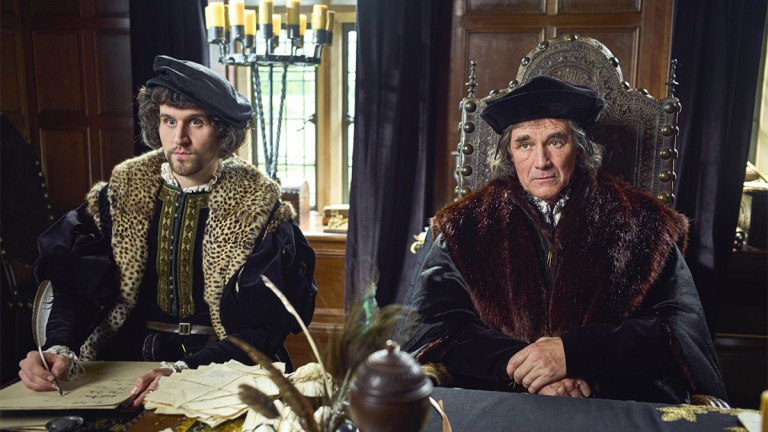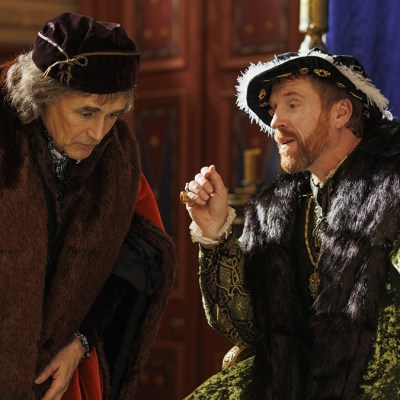Wolf Hall: The Mirror and the Light Episode 2 Review: Obedience
Has Cromwell already made the mistake that will bring him down? Spoilers.

Warning: contains spoilers for The Mirror and the Light season 2 episode 2.
If only Hilary Mantel had lived 10 lifetimes, she might have rehabilitated 10 other historical figures as skilfully as she did Thomas Cromwell. Mantel overwrote history’s shorthand for Cromwell, transforming him from a venal brute into a flesh-and-blood man capable, yes, of ruthlessness, but also of kindness, humour, love and grief. All of that was on display in this episode thanks to Mark Rylance’s many-faceted performance.
Cromwell’s grief made the most lasting impression. Anyone who’d observed the man’s steely operations at court might have been less surprised to find a crocodile in the corridor of Shaftesbury Abbey than a sobbing Lord Chancellor. We’re used to seeing Cromwell marshal his emotions and wear whichever face is required to reflect Henry’s wishes, deflect Henry’s anger, and intimidate Henry’s enemies. Weeping in the open is a new look, and a new vulnerability that showed how greatly hurt Cromwell was by Dorothea’s words.
Unable to dissuade Dorothea of her bitterly held view that he had betrayed her father Cardinal Wolsey, Cromwell was broken. His love for Wolsey is a North star when it comes to interpreting this tricky character. Their imaginary conversations are some of the very few times in Wolf Hall that Cromwell drops his defences and stops measuring his every word. For him to think that Wolsey, in his final days, suspected him of betrayal must cause unthinkable pain. “How do you remake your reputation with the dead?” Not in this life.
Who was it who poured that poison into Dorothea’s ear? Perhaps the Cardinal himself, or perhaps Cromwell’s enemies the Duke of Norfolk, or the Pole family.
Norfolk was absent in person from episode two, but behind most of its drama. Cromwell’s deeply enjoyable interrogation of Thomas “Tom Truth” Howard – England’s worst poet until Rick from The Young Ones – ended with the rhetorical question of who put into his mind the thought of marrying the king’s niece and one day becoming king himself. Of course it was Howard’s half-brother, Norfolk. As Lady Shelton warned, ever since his niece Anne Boleyn was separated from her head, the Duke has sought another route to the throne, and this was his latest.
Norfolk or the Poles, or both, could be behind the destructive rumour that Henry intends to marry Cromwell to his daughter Mary, a fabrication clearly designed to put the king in a killing vein.
Unless… It is a fabrication, isn’t it? Low-born Cromwell can’t possibly entertain hopes of marrying the daughter of English and Spanish royalty. So why does he risk looking like it by giving Princess Mary a ring? Artist Hans Holbein looked rightly green about that idea, and even though Cromwell told Meg Douglas that a ring is not a pledge, he must know how it might be interpreted. And what are we to make of Cromwell dwelling on Mary’s intimate declaration that she would like a child of her own? Could our man be starting to push his luck?
Whatever he may have dreamed could be possible with Mary, it certainly isn’t now, and neither could Cromwell save his reputation with a quick kill-two-birds marriage to Dorothea.
Cromwell’s luck either being pushed or running out was a preoccupation of “Obedience”. The episode started with a replay of series one scenes showing Wolsey’s downfall, and it was more than just a useful catch-up for anybody with a foggy memory – it was a version in miniature of what’s to come. Wolsey’s story – a low-born rise to great wealth and influence followed by a cruel demise at the hands of Henry VIII – is also Cromwell’s story. When he and George Cavendish discussed what brought Wolsey down, his pride or having made an enemy of Anne Boleyn (Wolsey stopped a younger Anne from marrying nobleman Lord Henry Percy due to the Boleyn’s taint of “trade” and she never forgave him), we can also ask the same of Cromwell. What will be the great mistake that leads to his own downfall? And has it already been committed?
Lady Rochford would say it was committed when Cromwell gave the king what he wanted by removing two of his royal wives and publicly humiliating the crown with the scandalous charges against Anne Boleyn. Rochford may well be right. Others still would say it was committed decades ago, in Putney, when this clever strategist was born to a blacksmith and yet strode into the corridors of power as if he were equal to them. English nobility doesn’t take kindly to interlopers and parvenus, no matter how many royal portraits they commission to decorate their walls.
Those portrait commissions showed Cromwell growing into his new place in society and planning for his legacy. The impassioned speech he gave to son Gregory on the wrongs of the papist church and the utopian future he envisages for the Church of England showed us a man motivated by far more than personal gain. So did his patient explanations to both Gregory and cocky French servant Christophe. He’s teaching them both how to see the world, looking ahead to a time when he’s no longer in it.
When that day comes, it will be a duller place. What a pleasure it is to watch Cromwell at work, whether speaking in code to instruct Meg Douglas on how to wriggle her neck free of Henry’s noose, taking “Tom Truth” to task for his terrible rhymes and treacherous scheme, or delicately edging away from sad Jane Seymour’s sad questions about her marriage bed. Contrast his deft cleverness with Henry’s increasingly buffoonish behaviour – the Turkish disguise indeed. Both men have blood on their hands, but only one in Peter Straughan and Peter Kosminsky’s meticulous adaptation just earned our sympathy.
Wolf Hall: The Mirror and the Light continues on Sunday November 24 on BBC One and iPlayer. It will air on PBS Masterpiece in 2025.


